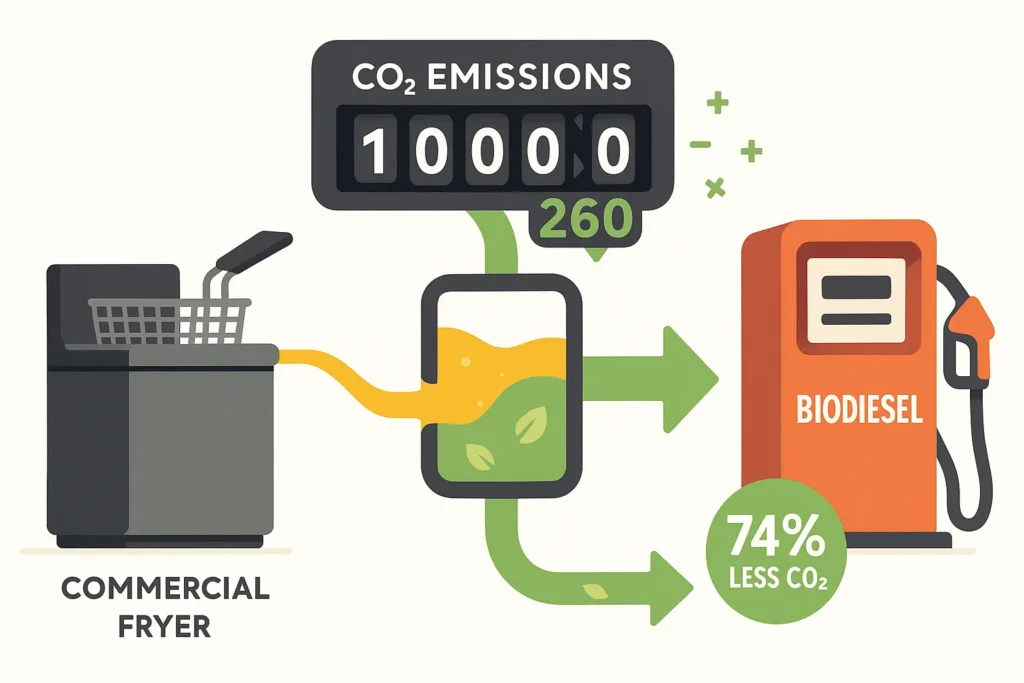Table of Contents
Quick take: Recycling restaurant cooking oil into biodiesel, renewable diesel and sustainable aviation fuel (SAF) cuts 40 86 percent of the greenhouse gas (GHG) load of petroleum fuels, blocks methane spewing sewer “fatbergs,” and through Grease Connections’ 24/7 monitored, hurricane proof collection network turns a kitchen headache into clean revenue and iron clad compliance.
Recycled Cooking Oil: The Fastest Way to Reduce Your Carbon Footprint
Used cooking oil (UCO) runs through the same diesel engines that power truck fleets, but with a fraction of the climate cost. Argonne National Lab calculates a 74 % life cycle CO₂ cut for 100 % biodiesel (B100) made from UCO compared with petroleum diesel. NREL’s 2024 review puts the real world range at 40 86 % depending on blend and feedstock. For a Miami high volume facility burning 1,000 gal/month of diesel in delivery vans, switching to B20 made from its own fryer oil avoids about 5 metric tons of CO₂ a year equal to planting 80 mangrove trees along Biscayne Bay.

The Carbon Math Behind UCO Fuels
California’s Low Carbon Fuel Standard (LCFS) assigns used oil biodiesel an average carbon intensity (CI) near 20 g CO₂e/MJ, five times cleaner than diesel at ~95 g CO₂e/MJ. EPA’s Renewable Fuel Standard backs the numbers, requiring a ≥50 % life cycle GHG cut for biomass based diesel.
| Fuel | Typical CI (g CO₂e/MJ) | % lower than diesel |
|---|---|---|
| Diesel | 95 | — |
| UCO Biodiesel | 20 | 79 % |
| UCO Renewable Diesel | 30 | 68 % |
The deeper drop comes from turning waste into fuel there’s no new farm, land use or drilling footprint.
Blocking Fatbergs = Extra Emissions Saved
FOG (fat, oil and grease) that slips down drains solidifies into “fatbergs.” One 30,000 kg fatberg removed in Perth this spring would have released methane equal to 75 tons of CO₂ if left to rot. Methane traps 28 × more heat than CO₂, so every gallon kept in a sealed Grease Connections tank shields both pipes and climate. Unsustainable Magazine notes that fatbergs drive 40 % of sewer blockages worldwide, hiking energy hungry pump cycles. In Atlanta, our clients report zero emergency pump outs since switching to proactive pickups proof that carbon and maintenance bills fall together.
From Fryer to Flight: Low Carbon Fuels in Action
UCO isn’t just for trucks. IATA confirms SAF made from UCO can cut aviation CO₂ by up to 80 %. Yet the Financial Times warns supply gaps persist because producers need steady feedstock contracts. Grease Connections’ year round collection in Orlando, Savannah and Newark feeds partner refineries, locking in price and volume. The Inflation Reduction Act sweetens the pot with up to $1.75 per gallon SAF tax credits for fuels beating a 50 % GHG cut. Restaurants that recycle today help decarbonize tomorrow’s flights out of Hartsfield Jackson and MIA.
Local Climate Wins: Florida | Georgia | New Jersey
Florida’s roadmap to net zero values distributed biofuels as a top three near term lever. Recycled oil from Tampa alone could displace 7 million diesel miles annually (state DOE estimate). Georgia already powers school buses in Macon with local biodiesel, trimming district fuel spend. In Newark, city procurement rules now grant bid credits to vendors using low CI fuels an easy rebate for eateries sending grease to fuel plants across the Hudson. Federal LCFS style policies coming in 2026 mean early movers bank credits before the rush.
The Grease Connections Circular Model
We collect with hurricane rated, leak proof tanks engineered in Jacksonville, track fill levels via IoT sensors, and dispatch pickups the moment capacity hits 80 %. Missed run? Grease Connections Guarantee: we pay any municipal spill fine, no questions asked. Internal audits show a double digit drop in grease trap pump outs and zero EPA reportable spills since 2022. Documentation lives in your customer portal for five year record retention ready for health or fire marshals on demand.
Compliance Made Simple
EPA, state DEP and local FOG codes require manifest trails. Our digital Bill of Lading auto matches each pickup to its CI score using CARB and GREET data sets, satisfying auditors in seconds. The system also maps your carbon intensity score a metric rising in green seal procurement across Tallahassee, Augusta and Jersey City.
24/7 Monitoring & Risk Reduction
Sensors benchmark tank temperature and send instant alerts if lids are left open a theft deterrent that slashed grease loss events in Fort Lauderdale kitchens last season. Every route optimizes with real time traffic to cut empty miles, mirroring LCFS logic that counts transport emissions. Your carbon footprint shrinks even before the oil hits the biorefinery.
Clean Revenue & Cost Control
Under the LCFS, each metric ton of CO₂e avoided earns a credit now trading above $80. Grease Connections splits that upside, turning waste oil into a steady rebate check while stabilizing disposal budgets against rising wastewater charges (USA average $2 $5 per 1,000 gal). Clients in Tampa and Atlantic City fund new fryers from last year’s checks no cap ex required.
| Scenario | Annual fines for un managed grease | Annual Grease Connections cost | Net position |
|---|---|---|---|
| DIY disposal | $5,000+ in blockages & violations | n/a | –$5k |
| GC Service | $0 fines (guaranteed) | Service fee offset by rebates | Positive |
Ready for Worry Free Oil Recycling?
Request your free compliance audit and see projected CO₂ savings for your exact fryer capacity. Our Miami dispatch can have a smart tank on your dock in 48 hours Atlanta and Trenton routes depart twice weekly.








